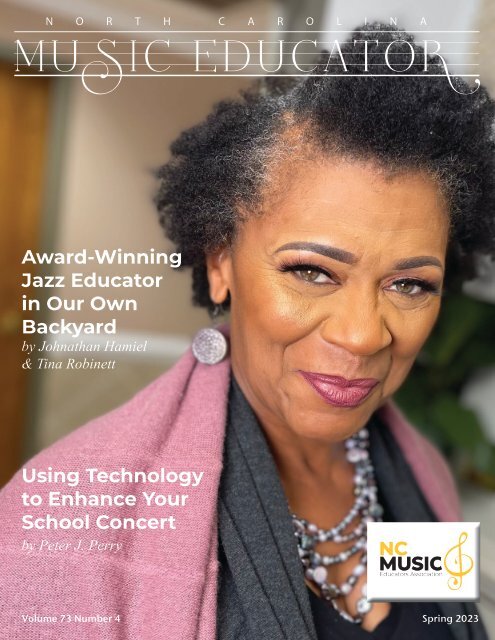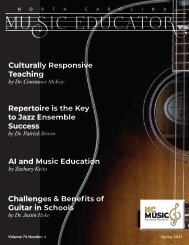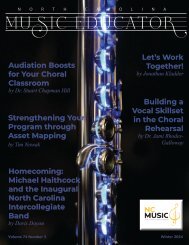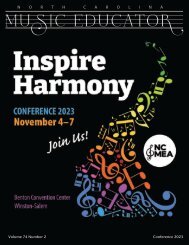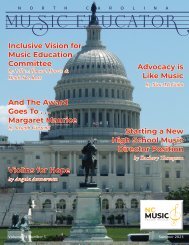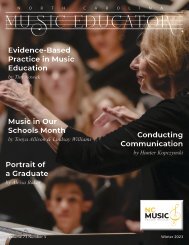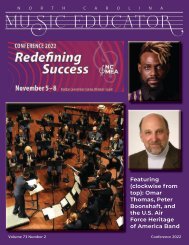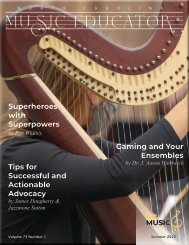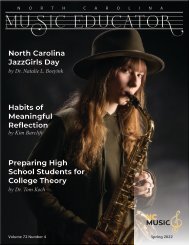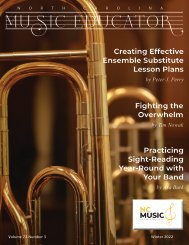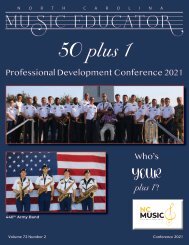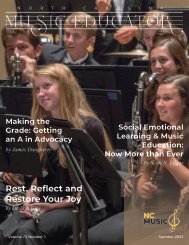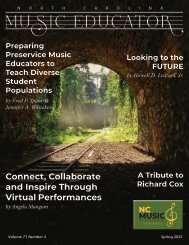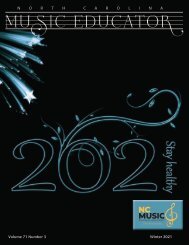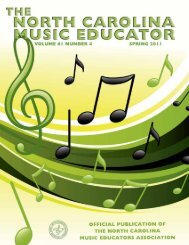Spring 2023
North Carolina Music Educator Journal Spring 2023
North Carolina Music Educator Journal Spring 2023
You also want an ePaper? Increase the reach of your titles
YUMPU automatically turns print PDFs into web optimized ePapers that Google loves.
N O R T H C A R O L I N A<br />
MUSIC EDUCATOR<br />
Award-Winning<br />
Jazz Educator<br />
in Our Own<br />
Backyard<br />
by Johnathan Hamiel<br />
& Tina Robinett<br />
Using Technology<br />
to Enhance Your<br />
School Concert<br />
by Peter J. Perry<br />
Volume 73 Number 4 <strong>Spring</strong> <strong>2023</strong><br />
NORTH CAROLINA MUSIC EDUCATOR | 1
ANNOUNCING THE<br />
$6 MILLION<br />
MAKING MUSIC.<br />
MAKING A DIFFERENCE.<br />
CHAUNCEY<br />
SCHOLARSHIP ENDOWMENT<br />
UNCW DEPARTMENT OF MUSIC<br />
SPRING <strong>2023</strong><br />
MUSIC<br />
FESTIVALS<br />
APPLY AND AUDITION<br />
FOR SCHOLARSHIP CONSIDERATION<br />
SATURDAY, DEC. 3, 2022 • SATURDAY, JAN. 21, <strong>2023</strong> • SATURDAY, FEB. 11, <strong>2023</strong><br />
SATURDAY, FEB. 18, <strong>2023</strong>* • SATURDAY, MARCH 18, <strong>2023</strong><br />
East Carolina University is committed to equality of opportunity and prohibits unlawful<br />
discrimination based on the following protected classes: race/ethnicity, color, genetic information,<br />
national origin, religion, sex (including pregnancy and pregnancy-related conditions), sexual<br />
orientation, 2 | NORTH gender CAROLINA identity, MUSIC age, disability, EDUCATOR political affiliation and veteran status.<br />
prior to the event. Questions regarding UNCW’s Title IX compliance<br />
should be directed to titleix@uncw.edu.<br />
NORTH CAROLINA MUSIC EDUCATOR | 1<br />
C.S. 23-0136<br />
EMAIL FOR MORE INFORMATION: musicadmissions@ecu.edu<br />
*Feb. 18, <strong>2023</strong>: Last audition day for scholarship consideration<br />
East Carolina University ® • Greenville, NC • music.ecu.edu<br />
FLUTE ENSEMBLES FESTIVAL<br />
Friday-Saturday, Jan. 21 - 22<br />
Mary Jo White · whitemj@uncw.edu<br />
PIANO DAY<br />
Saturday, Feb. 11<br />
Barry Salwen · salwenb@uncw.edu<br />
NC HORN DAY<br />
Saturday, Feb. 25<br />
Nicholas Fife · fifen@uncw.edu<br />
JAZZ FEST<br />
Friday, March 24<br />
Jerald Shynett · shynettj@uncw.edu<br />
BRASS FEST<br />
Saturday, April 1<br />
Daniel Johnson · johnsond@uncw<br />
SUMMER CONCERT BAND<br />
Monday evenings, May 8-June 26<br />
Dominic Talanca · talancad@uncw.edu<br />
UNCW is an EEO/AA Institution.<br />
Accommodations for disabilities may be requested<br />
by contacting the Disabilities Resource Center at 910.962.7555 at least seven days<br />
CONTACT THE UNCW FACULTY DIRECTOR LISTED<br />
FOR INFORMATION, INCLUDING<br />
· student age groups for each event<br />
· schedules and activities<br />
· benefit to teachers and students<br />
· registration and fees<br />
· how to participate<br />
And ask about workshops<br />
just for teachers!<br />
910.962.3390<br />
uncwmus@uncw.edu<br />
uncw.edu/music
N O R T H C A R O L I N A<br />
MUSIC EDUCATOR<br />
uncp.edu/music • music@uncp.edu • 910.521.6230<br />
NCMEA Board Directory<br />
4<br />
A special thank you to all our advertisers who<br />
NCMEA Executive Director’s Message<br />
Susan Heiserman<br />
NCMEA President’s Message<br />
Johnathan Hamiel<br />
Using Technology to Enhance<br />
Your School Concert<br />
by Peter J. Perry<br />
6<br />
8<br />
10<br />
support music educators and music education in<br />
North Carolina.<br />
Brevard College<br />
17<br />
East Carolina University Inside Front Cover<br />
Hayes School of Music<br />
11<br />
MUSIC EDUCATION<br />
MUSICAL THEATRE<br />
BACHELOR OF ARTS<br />
MUSIC INDUSTRY EMPHASIS<br />
Orchestra Section<br />
14<br />
NAfME<br />
23, Back Cover<br />
Across the Districts<br />
15<br />
Pfeiffer University<br />
13<br />
Band Section<br />
Award-Winning Jazz Educator in<br />
Our Own Backyard<br />
Johnathan Hamiel & Tina Robinett<br />
Elementary Choral Section<br />
Middle School Choral Section<br />
16<br />
18<br />
20<br />
22<br />
UNC Charlotte<br />
UNC Greensboro<br />
UNC Pembroke<br />
UNC Wilmington<br />
7<br />
19<br />
3<br />
1, 21 23<br />
High School Choral Section<br />
24<br />
Technology Section<br />
25<br />
Changed Schools? New Email Address?<br />
New Mailing Address?<br />
Stay in touch with NCMEA/NAfME<br />
Log in to the NAfME Member Portal and make<br />
your updates.<br />
www.nafme.org LOGIN then MEMBER PORTAL<br />
If you need assistance, call NAfME Member<br />
Services 800-336-3768<br />
Postmaster: Send address changes to: NC Music Educator, c/o<br />
NCMEA, 883-C Washington Street, Raleigh, NC 27605.<br />
Non-Profit 501(c)(3) Organization U.S. Postage Paid at Lubbock,<br />
Texas. ISSN Number 0400-3332 EIN number<br />
20-3325550<br />
Editorial: All editorial content should be sent to: Kimberly<br />
Justen, Editor-in-Chief, at journal_editor@ncmea.net.<br />
Advertising: Information requests and ad orders should<br />
be directed to Kimberly Justen, Editor-in-Chief, at<br />
journal_editor@ncmea.net.<br />
North Carolina Music Educator is copyrighted. Reproduction<br />
in any form is illegal without the express permission of the<br />
editor.<br />
UNCP is one of the most affordable universities in<br />
North Carolina. With NC Promise, undergraduate tuition<br />
at UNCP is $500 per semester for in-state students and<br />
$2,500 per semester for out-of-state students.<br />
SCAN THE<br />
QR CODE TO<br />
APPLY NOW!<br />
Accredited by the National Association of Schools of Music<br />
This publication is available in alternative formats upon request. Please contact the Accessibility Resource Center, Oxendine Administrative Building, Room 110, or call 910.521.6695.<br />
2 | NORTH CAROLINA MUSIC EDUCATOR NORTH CAROLINA MUSIC EDUCATOR | 3
Board of Directors<br />
EXECUTIVE OFFICERS<br />
SECTION CHAIRS<br />
COMMISSION & COMMITTEE CHAIRS<br />
President: Johnathan Hamiel*<br />
Orange County<br />
jhamiel@ncmea.net<br />
Immediate Past President: Carol<br />
Earnhardt*<br />
Forsyth County<br />
cearnhardt@ncmea.net<br />
President-Elect: Catherine Butler*<br />
Guilford County<br />
cbutler@ncmea.net<br />
Recording Secretary:<br />
Carolina Perez*<br />
Durham County<br />
secretary@ncmea.net<br />
Member-at-Large:<br />
Jordan Lee*<br />
Guilford County<br />
member-at-large1@ncmea.net<br />
Member-at-Large: Lorena Schakel*<br />
Stokes County<br />
member-at-large2@ncmea.net<br />
Band: Jim Kirkpatrick*<br />
Burke County<br />
band_chair@ncmea.net<br />
Band Section Delegate:<br />
O’Shae Best*<br />
Mecklenburg County<br />
band_delegate@ncmea.net<br />
Collegiate NAfME: Sabina Blue*<br />
Robertson County<br />
collegiate_president@ncmea.net<br />
Elementary: Joseph Girgenti*<br />
Union County<br />
elementary_section@ncmea.net<br />
High School Choral: Aleisa Baker*<br />
Buncombe County<br />
hschoral_chair@ncmea.net<br />
Higher Education: Jose Rivera*<br />
Robeson County<br />
higher_education@ncmea.net<br />
Jazz Education: Tina Robinett*<br />
Buncombe County<br />
jazz_chair@ncmea.net<br />
Jazz Section Delegate: Luke Meade*<br />
Johnston County<br />
jazz_delegate@ncmea.net<br />
Middle School Choral: Emily Turner*<br />
Wake County<br />
mschoral_chair@ncmea.net<br />
Orchestra: Joseph Walker*<br />
Durham County<br />
orchestra_chair@ncmea.net<br />
Orchestra Section Delegate:<br />
Matthew Holt*<br />
Durham County<br />
orchestra_delegate@ncmea.net<br />
Exceptional Children & General<br />
Music: Rue S. Lee-Holmes<br />
Sampson County<br />
exeptionalchildren_generalmusic@ncmea.net<br />
Conference Chair: Barbara Geer<br />
Forsyth County<br />
conference_chair@ncmea.net<br />
Asst. Conference Chair: Adam Joiner<br />
Forsyth County<br />
conference_assistant@ncmea.net<br />
Mentoring: Carol Earnhardt<br />
Forsyth County<br />
mentoring_program@ncmea.net<br />
Music In Our Schools Month:<br />
Tonya Allison & Lindsay Williams<br />
Forsyth and Onslow Counties<br />
miosm_chair1@ncmea.net (Tonya)<br />
miosm_chair2@ncmea.net (Lindsay)<br />
AWARDS, GRANTS<br />
& SCHOLARSHIP CHAIRS<br />
Music Program Leaders:<br />
Andrew Craft<br />
Forsyth County<br />
music_program_leader@ncmea.net<br />
Popular Music: Jonathan Kladder<br />
New Hanover County<br />
popular_music@ncmea.net<br />
Research: Tim Nowak<br />
Pitt County<br />
research_chair@ncmea.net<br />
Retired Membership: Libby Brown &<br />
Heidi Sue Ross<br />
Watauga & Wake Counties<br />
retired_membership@ncmea.net<br />
retired_cochair@ncmea.net<br />
Student Activities:<br />
Catherine Butler<br />
Guilford County<br />
cbutler@ncmea.net<br />
STANDING COMMITTEE CHAIRS<br />
Teacher Education: Jose Rivera<br />
Robeson County<br />
teacher_education@ncmea.net<br />
Technology Chair: Howell “Howie”<br />
Ledford & Julian Wilson<br />
Guilford and Gaston Counties<br />
technology_chair@ncmea.net<br />
Tri-M: Riley Lopez<br />
New Hanover County<br />
tri-m@ncmea.net<br />
Young Professionals: Emily AsKew<br />
Davidson County<br />
young_professionals@ncmea.net<br />
Webmaster: Mark Healy<br />
Wake County<br />
mhealy@ncmea.net<br />
EX-OFFICIO MEMBERS<br />
District 1: Lisa Murray*<br />
Pitt County<br />
district1@ncmea.net<br />
District 2: Bob Norem*<br />
Pender County<br />
district2@ncmea.net<br />
DISTRICT PRESIDENTS<br />
District 4: Roosevelt Pratt*<br />
Cumberland County<br />
district4@ncmea.net<br />
District 5: Ronald Forsh*<br />
Forsyth County<br />
district5@ncmea.net<br />
District 7: Janet Berry*<br />
Burke County<br />
district7@ncmea.net<br />
District 8: Open*<br />
district8@ncmea.net<br />
Awards: Jordan Lee<br />
Guilford County<br />
member-at-large1@ncmea.net<br />
Grants: Jordan Lee & Lorena Schakel<br />
Guilford and Wake Counties<br />
member-at-large1@ncmea.net (Jordan)<br />
member-at-large2@ncmea.net (Lorena)<br />
Scholarships: Lorena Schakel<br />
Wake County<br />
member-at-large2@ncmea.net<br />
NCMEA OFFICE<br />
883-C Washington Street<br />
Raleigh, NC 27605<br />
919-424-7008<br />
www.ncmea.net<br />
Executive Director: Susan Heiserman<br />
Wake County<br />
sheiserman@ncmea.net<br />
Advocacy: James Daugherty<br />
Davidson County<br />
jdaugherty@ncmea.net<br />
Constitution: Maribeth Yoder-White<br />
Watauga County<br />
constitution_committee@ncmea.net<br />
Finance: Carol Earnhardt<br />
Forsyth County<br />
cearnhardt@ncmea.net<br />
IVfME: Lillie Allmond Harris &<br />
Tim Nowak<br />
Guilford & Pitt County<br />
ivfme@ncmea.net<br />
Membership: Catherine Butler<br />
Guilford County<br />
cbutler@ncmea.net<br />
Publications: Kim Justen<br />
journal_editor@ncmea.net<br />
Collegiate NAfME Advisor:<br />
Lisa Runner<br />
Watauga County<br />
collegiate_advisor@ncmea.net<br />
Editor: Kim Justen<br />
journal_editor@ncmea.net<br />
Executive Director: Susan Heiserman<br />
Wake County<br />
sheiserman@ncmea.net<br />
Historian: Dr. John Henry, Jr.<br />
Guilford County<br />
historian@ncmea.net<br />
Music Industry Rep.: Adam Frank<br />
Mecklenburg County<br />
music_industry_rep@ncmea.net<br />
Parlimentarian: Dave Albert<br />
Wake County<br />
parlimentarian@ncmea.net<br />
District 3: Andrew Childers*<br />
Wilson County<br />
district3@ncmea.net<br />
District 6: Julia Winegardner*<br />
Mecklenburg County<br />
district6@ncmea.net<br />
* Voting Member<br />
Counties listed reflect the county taught in<br />
Communications Manager:<br />
Mark Healy<br />
Wake County<br />
mhealy@ncmea.net<br />
NCDPI Rep.: Brandon Roeder<br />
Wake County<br />
brandon.roeder@dpi.nc.gov<br />
advancing music education by promoting<br />
the understanding and making of music by all<br />
4 | NORTH CAROLINA MUSIC EDUCATOR NORTH CAROLINA MUSIC EDUCATOR | 5
Notes from the Executive Director<br />
Susan Heiserman<br />
It’s that time of year! As the flowers and trees are blooming,<br />
hopefully you are witnessing some musical blossoming in<br />
your classrooms and programs. Many of you are very busy<br />
preparing for MPAs, spring concerts and musicals, and other yearend<br />
activities; but amidst all the bustle, I hope you can find small<br />
moments to sit back, reflect on – and appreciate – your successes,<br />
no matter how large or small. You’ve brought people together.<br />
You’ve released beauty and joy into the world. There’s no doubt<br />
you’ve inspired someone this year.<br />
It’s for this reason we’ve landed on the theme Inspire<br />
Harmony for our <strong>2023</strong> Professional Development Conference.<br />
As music educators, you have the unique privilege to use your<br />
art to transcend boundaries and inspire harmony on all levels<br />
– musically, interpersonally, between cultures, and in society.<br />
This year’s conference will explore and celebrate the many ways<br />
outstanding educators are creating positive impact and change.<br />
Mark your calendars and plan to join us in Winston-Salem,<br />
November 4 – 7!<br />
We wrapped up a fantastic Music In Our Schools Month and<br />
have been working on a number of other advocacy items in the past<br />
months. With the help of NCMEA’s lobbyists, we have established<br />
many new connections with state government officials and have<br />
shared input on issues like teacher licensure and compensation,<br />
school report cards, accessing funding for music education, and<br />
other proposed initiatives such as an arts proficiency diploma seal<br />
and provisions to provide regular music classes to all K – 5 students<br />
in North Carolina. If you ever have questions or concerns about<br />
music education policy, please reach out to me.<br />
There are a number of other exciting things happening within<br />
NCMEA! From our new Popular Music Education Committee<br />
to webinars to the NCMEA podcast (now 12 episodes in!), our<br />
committees and leaders are working hard to identify and provide<br />
resources and support that meet the needs of all music educators<br />
across the state. We want all voices to be represented, so if you see<br />
a need in a particular area or have a special interest, please let us<br />
know – and consider joining our new Leadership Academy this<br />
August.<br />
Finally, I encourage you to consider nominating someone<br />
for an NCMEA award. There are many outstanding, deserving<br />
educators and administrators, but we need your help identifying<br />
them! Nomination forms for Honor Administrator, Pat Hall Music<br />
Educator Advocate, and the Hall of Fame awards will be open mid-<br />
April – mid-June. Visit www.ncmea.net/programs/awards to learn<br />
more.<br />
I wish you the best of luck as you wrap up another school year.<br />
If you have questions, need support, or want to get more involved<br />
with NCMEA activities or leadership, I’d love to hear from you.<br />
BOLD IDEAS.<br />
BIG CITY.<br />
Leadership Academy<br />
NCMEA recognizes that there are a lot of talented leaders<br />
within our membership – and we have a lot of leadership roles<br />
within the organization that could benefit<br />
from your involvement! For that reason,<br />
we’re starting a Leadership Academy<br />
for members who may be interested in<br />
deepening their involvement with NCMEA.<br />
The first cohort will start in August<br />
<strong>2023</strong> and will include an introduction<br />
to NCMEA’s history and organizational<br />
structure, how committees and meetings<br />
work, leadership styles, and more. The<br />
NCMEA Leadership Academy is a one-day<br />
academy that is free and open to any NCMEA member who<br />
would like to learn more about NCMEA policies, procedures,<br />
history, and how to run an effective business meeting; which<br />
includes Roberts Rules of Order and Parliamentary Procedure.<br />
The leadership camp will be facilitated by David Albert, past<br />
NCMEA president (2009-2011), and Maribeth Yoder White,<br />
past NCMEA president (2003 – 2005) and<br />
past Southern Division president (2012 –<br />
2014). We have so many wonderful leaders<br />
throughout the state of North Carolina.<br />
Every time we observe an All-County, All-<br />
District, All-State, or All-Region honors<br />
ensemble, we are reminded how lucky we<br />
are to serve such dedicated individuals.<br />
If you are interested in learning more<br />
about various leadership opportunities,<br />
please fill out this short form. (This is not a<br />
commitment to a leadership role or to the Leadership Academy,<br />
just an expression of interest!)<br />
Music at Charlotte<br />
UPTOWN PERFORMANCES EXCITING GUEST ARTISTS<br />
Charlie Parker at The Jazz Room Composer/Performer Pamela Z<br />
@clt_coaa<br />
COMMUNITY COLLABORATIONS<br />
Carlisle Floyd’s opera, Susannah<br />
At UNC Charlotte, studies go beyond the<br />
university and into Charlotte's creative community.<br />
With bold ideas and broad connections, our talented<br />
faculty, students, and alumni are shaping the civic<br />
imagination of this fast-growing city.<br />
Holocaust Remembrance Day Concert<br />
Backstage at the Eagles concert<br />
Renowned saxophonist Branford Marsalis<br />
music.charlotte.edu<br />
6 | NORTH CAROLINA MUSIC EDUCATOR NORTH CAROLINA MUSIC EDUCATOR | 7
President’s Message<br />
The winter months have been extremely busy but<br />
productive for the NCMEA leadership. As spring<br />
approaches, several of our music educators are preparing<br />
for Music Performance Adjudication (MPA). Best of luck to all of<br />
the music educators who are participating in MPA state festivals.<br />
As music educators, we all hold MPA in high regard. It is a great<br />
opportunity to receive adequate and legitimate feedback on our<br />
ensemble’s growth from year to year.<br />
As a young educator, MPA can be extremely intimidating.<br />
Because of this, we have encouraged our individual sections to<br />
have virtual “MPA Happy Hours” where educators can receive<br />
more information about the MPA process from experienced<br />
music educators and understand how to begin to prepare their<br />
ensembles and students for the MPA process. Please ask your<br />
section president to provide you with the location of those videos.<br />
Collegiate Presidential Chat<br />
In the 2022 Membership Comparative Report, we noticed<br />
our membership is beginning to grow to what it was before the<br />
pandemic. Analyzing the data, we also noticed that out of all of<br />
our membership, the section growing the least was the collegiate<br />
students; particularly at our Historically Black College and<br />
Universities (HBCUs).<br />
As a result, we have begun to have Presidential Chats where<br />
Susan Heiserman and I meet with collegiate music education<br />
majors via Zoom or face-to-face. During this time, we discuss the<br />
privileges of NCMEA membership, first year expectations, and<br />
the importance of instrumental and vocal method classes. I am<br />
very proud to report these students were engaged, eager to learn<br />
and asked many thought-provoking questions. I am very sure the<br />
future of music education is in good hands.<br />
Recently, I had the<br />
opportunity to present<br />
to the HBCU collegiate<br />
music educators and<br />
students at the 63rd<br />
Annual Intercollegiate<br />
Music Association<br />
(IMA) Conference.<br />
The IMA Conference<br />
was founded in 1960 as a vehicle for enriching and enhancing<br />
the development of the students of its member institutions;<br />
HBCU students from Maryland, Virginia, North Carolina and<br />
South Carolina. During this session, I had the opportunity to<br />
answer questions and debunk myths about local MEAs and their<br />
acceptance of HBCUs.<br />
Popular Music Committee<br />
I am sharing an excerpt from an article I wrote for the April<br />
Johnathan Hamiel<br />
2019 edition of NAFME’s Teaching Music entitled, “Every Child<br />
has a Song to Sing… Is Your Bias Silencing Your Classroom.”<br />
“As a music educator, one of the most detrimental<br />
things I hear students say is that he or she loves music<br />
but hates music class. Have we done these students a<br />
disservice by not accepting their music as art forms<br />
worthy of study? Rejecting your students’ music, to them,<br />
can mean not accepting them, their family history, or<br />
the culture and community of which they are a part. I<br />
challenge you to reflect on the practices that you use and<br />
to ask yourself whether they welcome and include each of<br />
your students in all of the demographic areas that your<br />
school serves. Are the art forms they cherish authentic<br />
to the culture represented? Is there evidence of cultural<br />
pluralism and different musical points of view? I challenge<br />
you to listen to the ideas and the music of your students!”<br />
I also wrote an article that was featured in the August 2021<br />
“Jam Session” in Teaching Music, which stated, “The most<br />
important thing I’ve learned from students during the pandemic<br />
is that an interested mind is an invested mind.”<br />
Why are these articles important or relevant now? We are<br />
at a precipice of a new era of music education. At a time where<br />
student interest in any subject is at an all-time low, one thing<br />
they are continually interested in is music. But are we listening to<br />
the voices of the students we serve? Better yet, how can we listen<br />
to the voices of the students not in our music classes? Who will<br />
speak for them? What are their thoughts and beliefs and why<br />
aren’t they in the room if they love music? Money? Access? In the<br />
aforementioned articles, I described how educators in any school<br />
in the country can see students with earphones on, listening to<br />
– and enjoying – music while going to class. Some of them are in<br />
music classes and some are not.<br />
We have to accept that everyone may not be interested in the<br />
traditional forms of music education. Just because they are not<br />
interested in the typical band, orchestra, and chorus setting does<br />
not mean they can’t participate in music education. So many<br />
students are making music with technology, on their phones or<br />
other types of platforms.<br />
As president of NCMEA, I feel it is our job to provide<br />
opportunities for students and teachers to share what they are<br />
creating and embrace their work! Music is the same, regardless<br />
of band, chorus, orchestra, or electronic and popular music. All<br />
sections are finding and creating new ways to manipulate sound,<br />
rhythm, form, melody, style, and texture. At our core, these<br />
values are the basic elements of music.<br />
With this in mind, and due to the ongoing trend of<br />
technology in music, it is with great honor and excitement that<br />
I would like to announce the formation of a new committee<br />
on the NCMEA Board of Directors! In January, the board<br />
voted unanimously to form a Popular Music Committee. This<br />
committee will be chaired by Dr. Jonathan Kladder, assistant<br />
professor of music education at UNC Wilmington. I am eager to<br />
see the positive impacts of this committee and how it brings more<br />
voices to our NCMEA table.<br />
Music in Our Schools<br />
Month<br />
It has been said, March enters in<br />
like a lion and goes out like a lamb.<br />
Well, the leadership of NCMEA have<br />
been ferocious when addressing our<br />
advocacy goals in music education.<br />
In March, we celebrate Music in<br />
Our Schools Month. For more<br />
than 30 years, March has been<br />
officially designated by the National<br />
Association for Music Education<br />
(NAfME) for the observance of<br />
Music in Our Schools Month®<br />
(MIOSM®), the time of year when<br />
music education becomes the focus of<br />
schools across the nation.<br />
In North Carolina, we had a<br />
series of performances across the<br />
state to celebrate MIOSM and bring<br />
awareness to our hard-working music<br />
educators, as well as highlight how<br />
music education changed our lives<br />
and the lives of our students. This<br />
year, we had a series of performances<br />
at NCDPI, which included:<br />
• March 9: Martin Middle School<br />
(Wake County), Allison Thomas,<br />
choral director<br />
• March 14: MScotland High Symphonic Band (Scotland<br />
County), Matthew Jorgensen, band director<br />
• March 16: W.J. Gurganus Elementary School (Craven<br />
County), Luana Palimetakis, music teacher<br />
• March 21: Walter Williams High School (Alamance County),<br />
Veronica Biscocho, orchestra director<br />
• March 22: Fox Road Elementary music students (Wake<br />
County, Monica Keele Jones, music teacher<br />
• March 29 (virtual): Nesbitt Discovery Academy (Buncombe<br />
County), Ben Sharp, orchestra director<br />
• March 23: W.B. Wicker Elementary School (Lee County),<br />
Hannah Kauffmann, music teacher<br />
NCDPI has been extremely supportive of music education.<br />
So much so that our State Superintendent Catherine Truitt has<br />
created a video to be shared with everyone about her story of<br />
going to a performing arts high school and playing piano as a<br />
child. She even mentioned her father, who is still a practicing<br />
music educator/band director at the age of 77. We look forward<br />
to collaborating with Superintendent Truitt and her goals as they<br />
pertain to the future of music education.<br />
We are very excited to bring you a new composition by Liz<br />
and Chris Betsch from Onslow County. If you perform this piece<br />
this year, don’t forget to add #MIOSM<strong>2023</strong> to all of your social<br />
posts and to send the composers an email to let them know how<br />
their music has reached our community. The new music is free<br />
to download at the NCMEA website<br />
under MIOSM.<br />
This year MIOSM is even more<br />
special to NC music educators<br />
because Governor Roy Cooper<br />
has proclaimed March Music in<br />
Our Schools Month. We are very<br />
appreciative of Governor Cooper<br />
and his office as he supports the<br />
music educators, music students and<br />
music education in the state of North<br />
Carolina.<br />
Upcoming Events/<br />
Webinars<br />
Guitar Literature – Guitar<br />
Method<br />
Books and<br />
Curriculum<br />
Resources<br />
Saturday, May<br />
20, 11a.m. –<br />
12p.m., ET<br />
There are<br />
dozens of guitar method books and<br />
resources available for teachers to use<br />
in their classrooms. But, which one<br />
would you pick? In this Zoom session,<br />
Chris Perez will discuss different method books available so you<br />
can tailor instruction to the needs of your guitar students and<br />
program. We will also review guitar method resources (scales,<br />
rhythms studies, warm-ups, solo/ensemble music and more) that<br />
may be immediately applied to your classroom teaching as well as<br />
the future.<br />
Listening To & Learning From Rural Music<br />
Educators<br />
Saturday, May 20, 9 – 11a.m., ET<br />
Music-teacher educators from UNC-Wilmington, East<br />
Carolina University, and Louisiana State University will facilitate<br />
a conversation to explore practical issues that K-12 music teachers<br />
face everyday. They will share findings from recent research<br />
as practical professional development, specifically designed<br />
to address the needs and guide next steps toward equity and<br />
excellence for rural music teachers and their students. If you are<br />
one of the many music educators in rural North Carolina, be sure<br />
to take advantage of this webinar for professional networking and<br />
learning opportunity!<br />
8 | NORTH CAROLINA MUSIC EDUCATOR NORTH CAROLINA MUSIC EDUCATOR | 9
Using Technology<br />
to Enhance Your<br />
School Concert<br />
by Peter J. Perry, D.M.A.<br />
I<br />
will never take for granted the ability to sit down in person<br />
with other people and play music together. One thing the<br />
pandemic especially took away from musicians was this<br />
ability, and more specifically, the ability to perform together for<br />
our community. The excitement of having LIVE (non-virtual)<br />
performances is palpable for our students and audiences. Some<br />
performance mitigations that were previously necessary to get<br />
back to this point used technology and can actually be beneficial<br />
features to incorporate into our current and future programs.<br />
While many of us may have technology heartburn, below are<br />
two great ways to use some of the technology skills we acquired<br />
during the pandemic to enhance the student and audience concert<br />
experience (and make your life easier too).<br />
Digitize Your Concert Program<br />
A digital program<br />
is an online document<br />
located in the cloud<br />
containing your concert<br />
program. Typically,<br />
audience members access<br />
the program via Quick<br />
Response (QR) Code.<br />
Admittedly, I am late to<br />
the game on this.<br />
While I knew of<br />
other educators and<br />
some professional<br />
performance venues<br />
using digital programs,<br />
I did not even consider<br />
a digital program until I needed one that was contactless. I had<br />
my template set, timeline to print laid out, and liked the “feel”<br />
of a program in my hands during a performance (I still do). The<br />
digitized version, however, has a lot of positive aspects.<br />
Reprinted with permission from National Association for Music Education<br />
(NAfME). The original article published on May 19, 2022 can be found here.<br />
First and foremost, you can create a beautiful full-color<br />
concert program FOR FREE. Unless you have a connection with<br />
a commercial print shop this is nearly impossible with printed<br />
programs. It also is current with our societal technology trends<br />
and is sustainable (consider the box of unused programs that get<br />
recycled or trashed after each concert). Additionally, as a digitized<br />
document, you can make the program more dynamic.<br />
You can:<br />
Digital Program on CANVA, online publishing application<br />
• Add active links to your program’s website or social media<br />
feeds.<br />
• Link program notes to selections.<br />
• Spruce up the program with animated GIFs.<br />
• Accept donations to an online payment system (OPS).<br />
As a “living”<br />
document, you can<br />
continue to make<br />
edits to the program<br />
up to the concert’s<br />
downbeat. While I<br />
am not suggesting<br />
procrastination, we<br />
all have proofread a<br />
program a thousand<br />
times just to have an<br />
error brought up the<br />
night of the concert<br />
(after a thousand<br />
programs were printed).<br />
With the digital<br />
program, a simple edit fixes this problem and alleviates this worry<br />
– even if it is as you take your first bow. These are all impossible<br />
on physical paper.<br />
You can use any publishing or word processing application to<br />
MOUNTAINEER<br />
Audition Required • Auditions in November, January and February<br />
55th Season of Cannon Music Camp • June 24–July 15, <strong>2023</strong><br />
PERSPECTIVE<br />
music.appstate.edu<br />
10 | NORTH CAROLINA MUSIC EDUCATOR NORTH CAROLINA MUSIC EDUCATOR | 11
create your digital program. The end result, however, needs to be<br />
a non-editable file (like a PDF) that can be saved in the cloud (like<br />
on Google Drive, iCloud, etc.). Applications like Microsoft Word,<br />
Microsoft Publisher, Google Docs, Apple Pages, Adobe Elements,<br />
and Affinity Publisher are all great.<br />
You should use what you are most comfortable with. Learning<br />
a new application while preparing a concert performance is not<br />
the goal here. I use Canva. This is online and free. It requires<br />
you to create an account, but the use of the app is free. I like that<br />
Canva is an all-in-one tool that is user-friendly. It allows you to<br />
create beautiful professional-grade programs (there are plenty of<br />
templates) and saves them<br />
on its cloud storage to be<br />
accessed by your audience.<br />
Canva has plenty of other<br />
tools and templates that you<br />
can use to create dynamic<br />
social media posts publicizing<br />
the concert or create and<br />
print flyers and posters for<br />
the concert.<br />
Use QR Codes<br />
Quick Response (QR)<br />
codes have really taken off<br />
as a contactless method<br />
of accessing and sharing<br />
information via smart phone or tablet. Most portable devices have<br />
QR code readers built into them natively, and as QR code use has<br />
increased, more people are comfortable using them. I have been<br />
using QR codes for a while now.<br />
Specifically, I would use them to give parents my contact<br />
information and the music department website at back-to-school<br />
night. It has taken a while, but parents are much more comfortable<br />
and capable of using this method now. I have also always put<br />
the QR code for our music department website on the physical<br />
concert programs and posters.<br />
As mentioned before, to use digital programs you need to<br />
provide the program’s web address to the audience. Converting<br />
the web address to a QR code is a great way of doing this. I project<br />
the code on a screen via LCD projector throughout the concert as<br />
well as hang posters with the codes around the venue. Audience<br />
members just need to view the code with their device (typically<br />
with their smartphone or tablet camera) in order to access the<br />
program.<br />
QR Code<br />
QRCODE MONKEY Free Online QR Code Generator<br />
Administratively, I also use QR codes for<br />
signing students in and out the night of a<br />
concert. I use this tool for both attendance<br />
and as a grading measurement. I create a<br />
Google Form that collects the student names,<br />
ensembles, and student IDs. Each entry also<br />
creates a timecode which further enhances<br />
the record-keeping. This strategy is obviously one to use with<br />
older students who have mobile devices and are capable of using<br />
them this way. As with any class procedure, I find it is absolutely<br />
necessary to teach the students the right way to do this, and it is a<br />
process to finally get it totally right.<br />
To create a QR code, simply place the web address into a QR<br />
Code Generator. There are a many different ones online. Some<br />
cost money, some require you to create an account, but many do<br />
not. I like to use QR Code Monkey. Once the application generates<br />
the QR code, it then coverts it to a graphics file (typically PDF or<br />
PNG) you can download and use in your content material.<br />
The strategies explained<br />
here can streamline your<br />
concert preparation as<br />
well as enhance your<br />
concertgoers’ experience. I<br />
highly recommend trying<br />
one or both of these for<br />
your next concert. I do,<br />
however, also recommend<br />
that you do what is<br />
comfortable.<br />
Technology should<br />
help our process not<br />
hinder it. These strategies<br />
incorporate some<br />
pandemic teaching technology skills with the technology everyone<br />
carries around with them. Together, this tool can hopefully make<br />
your concert preparation less hectic and more productive.<br />
I outline these tips as well as many other ways to<br />
use technology in ensemble teaching on my website:<br />
www.peterperrymusic.net and in my book Technology Tips for<br />
Ensemble Teachers, published by Oxford University Press. Feel free<br />
to check them out. I hope these suggestions help.<br />
Have a great concert season!<br />
Peter Perry is a lifelong Maryland resident<br />
and has traveled the world teaching and<br />
performing music. A NAfME member, he is<br />
currently in his twenty-sixth consecutive year<br />
as Instrumental Music Director at Richard<br />
Montgomery High School in Rockville,<br />
Maryland. Here he conducts the: Chamber<br />
Orchestra, Concert Orchestra, Pit Orchestra,<br />
Symphonic Band, Jazz Ensemble, Concert<br />
Band, and Marching Band. These ensembles consistently receive critical<br />
acclaim on local, state, and national levels.<br />
Follow Dr. Perry on Twitter: @peterperry101 or at<br />
www.peterperrymusic.net.<br />
12 | NORTH CAROLINA MUSIC EDUCATOR NORTH CAROLINA MUSIC EDUCATOR | 13
O<br />
rchestra<br />
Joseph Walker, Chair<br />
Across the Districts<br />
We’ve made it through the busiest season of<br />
the school year. While I enjoy the plethora<br />
of auditions, honors ensembles, concerts,<br />
adjudications, etc., I always look forward to a brief<br />
respite over spring break. With traditional student events<br />
returning this year, I’ve found myself reflecting on why we<br />
offer such opportunities and why they are important for<br />
our students.<br />
Although weekend events are often exhausting for all<br />
involved, students who participate reap great rewards,<br />
both musically and extra-musically. Bravo to all of our<br />
event chairpersons and site hosts for organizing valuable<br />
experiences for our students, and a special thanks to our<br />
teachers for encouraging student participation.<br />
Many of you have recently attended the ASTA National<br />
Conference in Orlando, but I’d like to give a special<br />
shout-out to our NCMEA members who presented at the<br />
conference. Dr. Rebecca MacLeod of UNC Greensboro<br />
organized the conference; Scott Laird, Adrian Gordon, Laura<br />
Black, and Dr. Christen Blanton presented sessions; and the<br />
Ardrey Kell High School Chamber Orchestra, under the direction<br />
of Amanda Turner, performed in the National Orchestra Festival.<br />
Our section was well represented in Orlando! Amanda says<br />
she and her students had a great experience at the National<br />
Orchestra Festival, receiving valuable feedback from esteemed<br />
adjudicators, bonding as an ensemble, and especially playing the<br />
Ardrey Kell High School Chamber Orchestra<br />
fine instruments in the exhibit hall. Our section is proud of you<br />
for representing our state so well.<br />
Thinking ahead to next year, we will have a fantastic lineup<br />
of sessions for our Professional Development conference in<br />
November. We have several more sessions planned than in past<br />
years, and I hope I will see you there! Best wishes for a great<br />
ending to your school year.<br />
Music has healing power. It has the ability to<br />
take people out of themselves for a few hours.<br />
Elton John<br />
District 1<br />
District 1 is blooming with beautiful music this spring, with<br />
exciting all-district and all-county events, and musical celebrations<br />
for Music in Our Schools month!<br />
The Albemarle Area Middle Schools and High Schools hosted<br />
their annual “Albemarle Band Clinic” on March 24 – 25. This was<br />
a combined All-Area/All-State ensemble, consisting of students<br />
from Pasquotank, Camden, Currituck, Dare, Perquimans, and<br />
Chowan counties. This year, the middle school clinician was Nicky<br />
Pelzel, and the high school clinician was Crystal Cox. The clinic<br />
took place at First Flight High School in Kill Devil Hills.<br />
The Elizabeth City Pasquotank County Schools All-County<br />
Elementary Choir performed at the Arts of the Albemarle<br />
on March 18. The seven elementary schools were conducted<br />
by Traniqua Felton, an ECPPS music teacher at Weeksville<br />
Elementary.<br />
On Thursday, April 27, Beaufort County will hold its annual<br />
All-County performance event, Steppin’ Out. This performing<br />
arts fundraiser is open to the public and will feature students<br />
from each of Beaufort County’s elementary, middle, and high<br />
schools. For example, Eastern Elementary School in Washington<br />
will be represented by a select group of approximately 40 first<br />
graders, performing a rhythmic recitation of the book, I Was<br />
Walking Down the Road, by Sarah Barchas, accompanied by body<br />
percussion and directed by Dawn Rockwell.<br />
Special congratulations to Pitt County educators Jade Siebert,<br />
G.R. Whitfield Orchestra; and Jenifer Hutson, E.B. Aycock<br />
Band. Siebert received over $25,000 from a Perkins Grant for<br />
instruments and classroom equipment. Hutson received over<br />
$30,000 from the Gloria and Arthur Konig Foundation for<br />
instruments and classroom equipment.<br />
Lisa Murray<br />
District 1 President<br />
District1@ncmea.net<br />
District 3<br />
Great music and events are happening across District 3 of the<br />
North Carolina Music Educators Association this year! In this<br />
busy spring semester, many of our teachers and programs find<br />
ourselves in the middle of preparation for North Carolina Music<br />
Performance Adjudication, All-District Band, and the first Eastern<br />
Regional Chorus (formerly All-State).<br />
In Chatham County, Rebecca Clemens, band director at<br />
Margaret B. Pollard Middle School, was recognized by Chatham<br />
County Schools with the Power of ONE Award. This award<br />
recognizes an individual who has had a powerful impact in<br />
shaping the direction of someone else’s life. At the recent Central<br />
Region Jazz Clinic, Rebecca Clemens was awarded Jazz Director<br />
of the Year for the Central Region. Elliott Peterson, choral director<br />
at Jordan-Matthews High School in Siler City, was named the<br />
Beginning Teacher of the Year for Chatham County Schools.<br />
District 3 was also happy to announce the opening of a new<br />
elementary school: Apex Friendship Elementary School. The<br />
school is off to a great start in music education with performances<br />
at the Apex Tree Lighting and the Apex Town Council. Apex<br />
Friendship Elementary School is under the direction and<br />
leadership of Jenni Sonstroem.<br />
Lastly, many District 3 programs were able to participate in the<br />
second annual East Carolina University’s Men’s Choir Festival on<br />
February 4, <strong>2023</strong>. A combination of 78 high school singers and<br />
26 ECU chamber singers met in Greenville, to learn and perform<br />
exciting repertoire under the direction of Dr. James Franklin.<br />
The Men’s Choir Festival, fondly nicknamed “Dudefest” by Dr.<br />
Franklin, has doubled in participants in the second year and<br />
continues to nurture, teach and invest in the future of tenors and<br />
basses across eastern North Carolina. If your school or program<br />
would like to participate in “Dudefest” in the future, contact Dr.<br />
James Franklin or visit the ECU School of Music website.<br />
Andrew Childers<br />
District 3 President<br />
District3@ncmea.net<br />
14 | NORTH CAROLINA MUSIC EDUCATOR NORTH CAROLINA MUSIC EDUCATOR | 15
Band<br />
As you prepare to end this school year with spring<br />
concerts and year-end celebrations, we should take<br />
time to reflect on a very busy and successful year for<br />
the NC Bandmasters Association. Our year culminated in the<br />
Honors Band Clinic and Concerts at UNC Greensboro. The<br />
three clinicians who worked with our students are wonderful<br />
conductors and educators.<br />
N.C. All-State Honors Band Clinicians<br />
Kim Bain<br />
Kim Bain is in her fifteenth year as director of bands at Louis<br />
Pizitz Middle School in Vestavia Hills, Alabama. For 30 years,<br />
ensembles under her leadership have consistently been cited<br />
for musical excellence at both the state and national levels. In<br />
2015, Bain and the Louis Pizitz Symphonic Band performed at<br />
the prestigious Midwest Clinic in Chicago. The band received<br />
the 2015 National Band Association’s Blue Ribbon Award of<br />
Excellence. They were selected as a recipient of the coveted John<br />
Philip Sousa Sudler Cup in 2013. The Pizitz Symphonic and<br />
Concert Bands also performed at the 2013 Music for All-National<br />
Middle School Music Festival in Indianapolis.<br />
Invitational performances include the 2014 performances<br />
at CBDNA/NBA Southern Division Conference and the<br />
Southeastern United States Middle School Clinic. In 2017, the<br />
Pizitz Jazz Band and Percussion Ensembles performed at the<br />
Alabama Music Educator’s Conference; and the Symphonic Band<br />
performed at the Music for All-Regional Festival in Atlanta. In<br />
2018, the Pizitz Band performed at the CBDNA/NBA Southern<br />
Division Conference.<br />
In 2018, Bain was presented the Lacey Powell Outstanding<br />
Music Educator Award by the Alabama Music Educators<br />
Association. She was awarded the Phi Bet Mu, Rho Chapter,<br />
Outstanding Bandmaster Award in 2014 and named Teacher of<br />
the Year for the Vestavia Hills City Schools in 2012.<br />
She holds a Bachelor of Science in music education, a Master<br />
of Arts in music education, and an education specialist degree<br />
from the University of Alabama. She also holds a Master of Music<br />
Jim Kirkpatrick, Chair<br />
in saxophone performance from Bowling Green State University<br />
in Bowling Green, Ohio.<br />
Col. Timothy J. Holtan<br />
Col. Timothy J. Holtan retired in 2017 as the senior military<br />
musician in the Department of Defense. His final command was<br />
as the 10th Leader and Commander of The United States Army<br />
Band “Pershing’s Own.” He holds the distinction of being the only<br />
officer to command all three of the Army’s premier bands, which<br />
include the U.S. Army Field Band and the U.S. Military Academy<br />
Band at West Point.<br />
Holtan, a former school music educator in Montana, is a<br />
clinician for Conn-Selmer, Inc. and artistic director of the newly<br />
formed professional wind band, The Maryland Winds. He is a<br />
strong advocate for music education, enjoys substitute teaching,<br />
and is in demand as a guest conductor, clinician and adjudicator.<br />
In 2000, Holtan was selected for the Army’s “Training with<br />
Industry” program. He served as the director of operations and<br />
associate conductor of the Dallas Winds, while concurrently<br />
pursuing doctoral studies at the University of North Texas. He<br />
holds music education degrees from Montana State University and<br />
the University of Montana.<br />
His ensembles have been seen on many nationally televised<br />
broadcasts and diverse stages, and for the 2017 Presidential<br />
Inaugural Concert at the Lincoln Memorial. Under his leadership,<br />
the West Point Band reestablished a partnership with the New<br />
York Philharmonic, which resulted in five Lincoln Center joint<br />
concert performances. Holtan also led the West Point Band in<br />
the Emmy-nominated PBS television production, Marina at West<br />
Point, reaching over 180 million viewers.<br />
He served for twelve years on the National Band Association<br />
board of directors and has received multiple Citations of<br />
Excellence. In 2011, he was the University of Montana’s School of<br />
Visual and Performing Arts “Odyssey of the Stars” honoree and<br />
was inducted into their Hall of Honor.<br />
Alfred L. Watkins<br />
Alfred L. Watkins is co-founder, musical director and<br />
conductor of the Cobb Wind Symphony, an adult community<br />
band in Marietta, Ga. In 2013, he concluded his 37-year career as<br />
a high school band director, including serving as director of bands<br />
at Lassiter High School in Marietta, for 31 years.<br />
He graduated Florida A&M University, with additional study<br />
in music education and conducting at Georgia State University.<br />
Ensembles under his batons have performed at the Midwest<br />
Band Clinic five times, and been featured band performers at<br />
the Music for All National Festival, the GMEA Convention, and<br />
at the College Band Directors/NBA Biennial Convention. The<br />
Lassiter Trojan Marching Band has performed in four Pasadena<br />
Tournament of Roses Parades and three Macy’s Thanksgiving Day<br />
Parades. They are two-time Bands of America Grand National<br />
Champions and winners of nine Bands of America Regional<br />
Champions.<br />
Watkins received the Edwin Franko Goldman Award from<br />
ASBDA and the Midwest Clinic Medal of Honor. He served<br />
as guest conductor of the World Youth Wind Symphony at<br />
the Interlochen Arts Camp, and the United States Army Band<br />
“Pershing’s Own.” In 2022, he was the recipient of the Outstanding<br />
Conductor Award from the Association of Concert Bands, and<br />
was awarded the Doctor of Music Education Honoris Causa from<br />
the VanderCook College of Music.<br />
Currently, Watkins is president and co-founder of the Minority<br />
Band Director National Association, Inc., an organization charged<br />
to serve, promote, celebrate and mentor minority band directors<br />
throughout the country.<br />
The entire North Carolina All-State Honors Band Clinic<br />
weekend would not be a success without the tireless work of the<br />
following dedicated professionals; please be sure to thank these<br />
directors for all the work they do to serve the North Carolina<br />
Bandmasters Association:<br />
Jamie Bream, Honors Band committee chair and<br />
past-president<br />
Ryan Ellefsen, Honors Band coordinator<br />
Rodney Workman, Honors Band treasurer<br />
Eddie Deaton, auditions coordinator<br />
Les Turner, O’Shae Best, and Kyler Zary, audition chairs<br />
Justin Sumners, auditions site host<br />
Olivia Spell, Wes Richardson and Tim Sale, clinic chairs<br />
Ruth Petersen, state webmaster<br />
Jonathan Caldwell and UNC Greensboro, clinic host<br />
People, Place, Purpose<br />
For more information visit www.brevard.edu/music or<br />
reach out to us at musicinfo@brevard.edu<br />
16 | NORTH CAROLINA MUSIC EDUCATOR NORTH CAROLINA MUSIC EDUCATOR | 17
Award-Winning<br />
Jazz Educator<br />
in Our Own Backyard<br />
by Johnathan Hamiel & Tina Robinett<br />
In October 2022, Doctor Lenora Zenzalai Helm<br />
Hammonds, interim music department chair at North Carolina<br />
Central University, was the inaugural recipient of the Jazz<br />
Music Awards’ Jazz Educator Award of Distinction. The awards<br />
recognize people who have made lasting contributions to jazz.<br />
NCMEA president Johnathan Hamiel recently sat down with<br />
Helm Hammonds to discuss her career, jazz and her recent award.<br />
What made you choose jazz?<br />
One of the things that my dad always taught me was to watch<br />
the crowd and go the other way. So my friends and peers in high<br />
school, they all liked the kind of music we listened to growing up:<br />
pop, R&B, soul, gospel…. I was in an R&B band. Only a handful<br />
of people liked jazz. I thought it was interesting music. The people<br />
I listened to who played jazz music, to me it was like mental chess.<br />
Musical chess. I didn’t want to do something that seemed simple<br />
and was just about shaking it on the dance floor.<br />
I thought it was intelligent music. I thought it was music<br />
that had good stories. I felt like it was the music of a culture that<br />
represented all of the diaspora. I thought it represented American<br />
excellence.<br />
I couldn’t articulate that at 15, which is the age when I chose<br />
jazz for myself, but I knew it was a special thing. My hair would<br />
stand up on the back of my neck when I would hear Billie Holiday<br />
or John Coltrane. And I thought, what is it about what they’re<br />
doing that makes them sound like that.<br />
Can you share your experience as a jazz educator, as<br />
a performer, and as a black female. How has that been<br />
maneuvering around the jazz world as a performer, educator<br />
and as a black female?<br />
I’m often the one and only. Right now, in my department, in<br />
terms of jazz women performers, I’m the only one that’s black.<br />
There’s a classical musician who’s on the research side of our jazz<br />
studies degree, but the performers are all men.<br />
In terms of jazz educators, when I go to jazz conferences, like<br />
Jazz Education Network (JEN), think<br />
how many black, jazz women educators<br />
who are senior administrators at their<br />
university.<br />
[There aren’t many], and so what<br />
that does to a student body is that<br />
you’re a unicorn. And sometimes, the<br />
incredulousness that comes with it… I<br />
had a peer, a chair of a department from<br />
another university, and I introduced<br />
myself to them at an event, and told<br />
them I enjoyed their performance.<br />
And they said oh, okay, you’re chair, like someone’s trying to<br />
figure it out. And I said yes, I wanted to see your performance<br />
this coming weekend, but I won’t be able to because I have a<br />
composition commission of my own, and I’ll be going out of town<br />
for that with a string quartet, and a vibraphone and myself.<br />
And he said, and you’re a composer? I said, yeah, and he said,<br />
but I thought you were a singer. And I said yes. So that thing of<br />
“but I thought you were a singer,” meaning the dissonance on his<br />
face of I’m a singer, I’m a composer, like that doesn’t work together.<br />
Maybe I should be a singer/songwriter. But the dissonance of that,<br />
“And you’re chair, right?”<br />
So, what that does to you, what Kimberly Crenshaw talks about,<br />
that intersectionality where people don’t have an idea of that nexus<br />
of “Oh, we hire women at our university.” “Oh yeah, and we hire<br />
blacks. We have this black man…” Or, “We hire diverse groups of<br />
people.” But the intersection of who I am is a dissonance for a lot of<br />
people.<br />
What that means is, you’re always working. You have to work<br />
twice as hard, and go faster, longer, better. What that means in the<br />
education space for our young people is they can’t be what they<br />
don’t see.<br />
I’m always navigating that intersection from my cultural<br />
self, my professional self as a scholar in a university setting, in<br />
a category and genre where the classical side of the house is<br />
watching to see if I’m going to give enough love and pay attention<br />
to everybody. My classical counterpart’s predecessors didn’t have<br />
to do that. They just had to not be a barrier, but they didn’t have to<br />
prove themselves.<br />
So I have to have the kind of countenance of I’m a human being<br />
who’s a musician. I’m a scholar and I’ve<br />
earned my work. That’s why I’ve pushed<br />
so hard to get my degree working full<br />
time. When I started as an adjunct<br />
A huge part of jazz is<br />
improvisation. What is the first<br />
thing you think about during an<br />
improvisation?<br />
The melody. Then I’m listening for<br />
who’s playing with me. So I know who’s<br />
going to respond with me.<br />
When you’re at a party, if you’re at a table, having drinks and<br />
food with friends, you start to match the energy of the way people<br />
are talking, what they’re talking about , how loud to be, if you laugh<br />
of whatever. You don’t just come in gangbusters and bring a whole<br />
different energy that doesn’t match.<br />
So beyond the melody, I’m listening to who my partners<br />
are, and then it’s what story do I want to tell? I think it’s terribly<br />
disrespectful to the audience to go in there ready, with a whole<br />
thing.<br />
Tell us about the Jazz Award, and what it felt like to win.<br />
I was astounded! It was the inaugural one, so it was really<br />
special to be the first one. But the Jazz Music Award is meant to<br />
UNCG Summer Music Camp<br />
Week 1: July 9–14, <strong>2023</strong> and Week 2: July 16–21, <strong>2023</strong><br />
Openings remain for select instruments. For more information<br />
and the online application, visit smcamp.uncg.edu.<br />
Audition Dates for <strong>2023</strong>–24<br />
December 2, <strong>2023</strong> February 10, 2024<br />
January 27, 2024 February 24, 2024*<br />
*priority deadline for scholarship/assistantship consideration<br />
Degree Programs<br />
Bachelor of Arts<br />
Bachelor of Music<br />
Music Minor<br />
Master of Music<br />
Doctor of Musical Arts<br />
Doctor of Philosophy<br />
Post-Baccalaureate Certificate<br />
Post-Masters Certificate<br />
be an answer to the GRAMMY awards, but for jazz artists. They<br />
organized the event in Atlanta and it felt like the Jazz GRAMMY’S.<br />
So to be the first one to receive the Jazz Educator Award of<br />
Distinction was amazing. It was surreal. So much so, that when<br />
I got the email, I read it quickly and<br />
thought they wanted me to present an<br />
award to someone.” And my husband<br />
said, “No, Lee, read it again. They’re<br />
giving you the award.” And I just wept.<br />
Being there was like being<br />
Cinderella. It was just amazing. After<br />
that, a lot of people… it’s so weird<br />
how getting an award like that, all of<br />
a sudden people take you a little more<br />
seriously. Or like I’ve been trucking<br />
along all this time. So it felt really good<br />
to be recognized for the work so far, four decades in.<br />
What performance are you most proud of, whether it’s your<br />
performance individually, or a student performance?<br />
My Vocal Jazz Ensemble performed at JEN a couple of years<br />
ago. The African American Jazz Caucus (AAJC) gave us the<br />
spotlight that year as the AAJC Spotlight Group. We had standing<br />
room only, and my students (from NCCU) showed out. They left<br />
no prisoners. Afterwards, our peers came up and said such great<br />
things. The elders in AAJC came up and said, “yes, you made us<br />
proud!” But those students showed them what it sounds like when<br />
you are proud of singing music from the diaspora. For my students,<br />
that was my favorite performance.<br />
18 | NORTH CAROLINA MUSIC EDUCATOR NORTH CAROLINA MUSIC EDUCATOR | 19
Elementary<br />
Joseph Girgenti, Chair<br />
UNCW DEPARTMENT OF MUSIC STUDENTS<br />
uncw.edu/music<br />
MAKING MUSIC.<br />
MAKING A DIFFERENCE.<br />
This is a busy time for us with final concert planning,<br />
graduations, assessments, and more. That is another reason<br />
why I’m so excited about our annual <strong>Spring</strong> Elementary<br />
Mini-Conference at UNC Wilmington on Saturday, April 22.<br />
Our theme for the conference and the remainder of the year is<br />
Connect, Collaborate, Reinvigorate. I chose those three words to<br />
serve as our pillars for rebuilding in a post-pandemic society.<br />
Connect: We need to focus on our<br />
connections with each other. As music<br />
specialists, we often feel like we’re on<br />
an island. However, let’s find ways to<br />
connect with others for the betterment<br />
of ourselves and our students.<br />
Collaborate: This is the perfect time<br />
to collaborate. Some of the best lessons<br />
and techniques come when teachers<br />
work together and bring their own<br />
strengths to the party.<br />
Reinvigorate: I challenge you to find<br />
something that brings you joy and gets<br />
you excited to teach every day. We have<br />
a great panel of presenters, including<br />
practicing elementary teachers and<br />
college professors. Here are the amazing<br />
sessions you will be able to attend:<br />
• Discover and Connect! Activities<br />
to Blend Music and Language<br />
Learning in your Classroom; Dr.<br />
Katy Strand<br />
• Tools for Meeting the Needs of<br />
Neurodiverse Students in the Music Room; Evelyn Snyder<br />
• Creative Movement: An Avenue for Musical Collaboration<br />
and Connections; Dr. Dan Johnson<br />
• Boomwhacker Fun; Dr. Ran Whitley<br />
• Play Like You Mean It: Building Musical Literacy Through<br />
Active Participation; Dr. Amanda Hoke and Jessica Lequire<br />
• Give Me 5 for Special Needs Students; Wendy Hardin<br />
• Ideas for Incorporating Everyday Improvisation; Laura<br />
Black<br />
On-site registration is available and the event will have both an<br />
in-person and virtual option. Virtual participants will receive zoom<br />
links for each session prior to the event. The Elementary board is<br />
excited to offer lunch, included in the registration fee. All college<br />
music education students are able to attend for free.<br />
We are also planning our fall NCMEA Conference. In addition<br />
to bringing some world class presenters, we are excited to be<br />
bringing back student performances<br />
to the elementary schedule. This is a<br />
perfect opportunity to showcase what<br />
you and your students do. While the<br />
application has closed for this year,<br />
please keep this on your radar for the<br />
2024 conference.<br />
Do you receive our quarterly<br />
newsletter, Elementary Music Matters?<br />
Our most recent issue included<br />
district updates, summer learning<br />
opportunities, grants, information on<br />
Mini-Conference, and so much more.<br />
If you have not been receiving our<br />
newsletters, please contact me or your<br />
district representative. You can also find<br />
all of our newsletters here.<br />
Speaking of summer learning,<br />
we already know of some awesome<br />
things happening in North Carolina.<br />
Summerfield Elementary School in the<br />
Greensboro area will be offering World<br />
Music Drumming Level 1 & 2 from June<br />
13 – 16. UNC Wilmington is offering<br />
Orff Levels I & II, June 19 – 30.<br />
On-site registration is available.<br />
As we continue to build our network across the state, we are<br />
still looking for teachers to volunteer as county contacts. County<br />
contacts are some of our biggest assets, communicating with the<br />
teachers in your area and our board. If communication is one of<br />
your strengths, we want you for these positions!<br />
As always, please feel free to contact me with any questions,<br />
comments, or concerns at elementary_section@ncmea.net.<br />
UNDERGRADUATE STUDY<br />
BACHELOR OF MUSIC IN MUSIC EDUCATION<br />
BACHELOR OF ARTS IN MUSIC<br />
PERFORMANCE:<br />
instrumental piano vocal<br />
GENERAL MUSIC<br />
JAZZ STUDIES<br />
MUSIC TECHNOLOGY<br />
910.962.3415<br />
uncwmus@uncw.edu<br />
UNCW is an EEO/AA Institution.<br />
Accommodations for disabilities may be requested<br />
by contacting the Disabilities Resource Center at 910.962.7555 at least seven days<br />
20 | NORTH CAROLINA MUSIC EDUCATOR prior to the event. NORTH Questions CAROLINA regarding MUSIC UNCW’s EDUCATOR Title IX compliance | 21<br />
should be directed to titleix@uncw.edu.<br />
MINORS<br />
choral music · general music<br />
jazz studies · musical theatre<br />
AUDITIONS<br />
SPRING <strong>2023</strong><br />
Saturday, January 14<br />
Saturday, February 4<br />
Saturday, February 25<br />
Saturday, March 18<br />
Saturday, March 25<br />
virtual auditions
work on at home.<br />
Middle School Choral<br />
Emily Turner, Chair<br />
Recharge and Renew<br />
You know those colleagues in your county, or friends at state<br />
conference who you always tell, “We HAVE to get together soon”?<br />
Make the time as your after-school responsibilities wind down,<br />
or plan to meet over the summer. You can each share a successful<br />
lesson or a piece of repertoire or two, but plan to specifically take<br />
time to talk about non-musical things! Get the benefit of time with<br />
like-minded colleagues and new ideas for the year to come!<br />
Orff Institute | Levels I & II<br />
June 19-30, <strong>2023</strong><br />
Wilmington, North Carolina<br />
Since<br />
2004<br />
Many of you have shared beautiful concerts by now<br />
and are in the last few weeks of school. Let me be<br />
among the first to wish you heartfelt congratulations<br />
on a successful year! The work you are doing in and out of your<br />
classrooms to serve your students is immense, and can feel like<br />
it often goes unnoticed. The work you do for the betterment of<br />
your students and their development as choral musicians is so<br />
important, and you are a treasure to our state and the choral music<br />
community.<br />
Here are 4 R’s that I hope will help you get the most out of the<br />
end of your school year and summer:<br />
Recruitment and Retention<br />
Host a “Bring a Friend to Choir” Event<br />
Rehearse new songs so that everyone, including your seasoned<br />
choir member, is learning on the same level. Make sure whatever<br />
you choose is something the students can fully learn in your<br />
designated time frame so everyone feels accomplished and proud<br />
when they leave your event.<br />
• Try a piece from the Justice Choir Songbook, which you<br />
can download with a suggested $10 donation from<br />
www.justicechoir.org/songbook/<br />
• Check out some new rounds.<br />
Celebrate Your Students’ Wonderful Accomplishments<br />
• Host an ice cream social and have each student sign up to<br />
bring in toppings.<br />
• Put your sections against one another in “Minute To Win It”<br />
games.<br />
• Watch your concert video and have your students fill out the<br />
MS MPA Large Ensemble Rubric.<br />
Play Games!<br />
Don’t forget about those musical games that you always put off<br />
until after the concert! Take time to enjoy them with your classes.<br />
Here are a few of my students’ favorites:<br />
• Pass the Beat Around the Room<br />
• Encore – similar to the Pitch Perfect a capella riff offs, students<br />
make teams and go back and forth singing songs with a<br />
specific word in the lyrics or title.<br />
• Rhythm Cups<br />
• Solfege Improv – have your students stand in a circle and<br />
designate the solfege syllables you’ll be using for the round.<br />
You can work on specific intervals, or let the entire scale be<br />
used for the game, whichever your students may need. For<br />
the example, we will only be using do-mi-sol. Each singer<br />
performs a pattern of the designated solfege syllables using<br />
the last syllable of the singer before them. Here’s an example:<br />
Student 1: do-mi-sol<br />
Student 2: sol-sol-mi<br />
Student 3: mi-sol-do<br />
Student 4: do-sol- do, etc…<br />
When this starts to feel easier for your students, experiment<br />
with longer patterns or even rhythmic patterns. You can also<br />
remove the solfege and choose a neutral vowel or syllable,<br />
which can eventually get them scatting without knowing it!<br />
Ready Yourself for Next Year<br />
• File away your octavos<br />
– Have students help on exam days, or when attendance is<br />
low due to field trips or testing schedules.<br />
• Make sub plans for both teaching and non-teaching<br />
substitutes.<br />
– Teachers Pay Teachers (TPT) is a wonderful, inexpensive<br />
resource.<br />
• Think about your concerts for next year. Do you have any<br />
themes in mind?<br />
– If possible, go ahead and schedule your performances, dress<br />
rehearsals, etc.<br />
– Use the last bit of monies for this school year to purchase<br />
octavos for the upcoming school year.<br />
• Purchase and teach the MS Honors Chorus piece now, so they<br />
can practice it over the summer. The audition piece is always<br />
announced at the Middle School All-State event and posted to<br />
the NCMEA website following the event.<br />
– Create rehearsal tracks for your students to take home.<br />
– Send home old sight reading examples for your students to<br />
Need a refresher on takadimi? Hoping to see some<br />
new repertoire for next year? There are lots of Professional<br />
Development (PD) opportunities in our state, where you can<br />
renew your love for choral music, while simultaneously learning<br />
new skills or refreshing your technique. We’ll be adding some PD<br />
opportunities specific to North Carolina on the Middle School<br />
Section of the NCMEA website, so be sure to take a look!<br />
Rest and Relax<br />
Take this well-deserved time off to rest and do nice things for<br />
yourself and your loved ones. Binge that streaming series or take<br />
the vacation without your computer! Do things that feed your soul<br />
and make you happy! This time of rest and relaxation will help<br />
prepare you for next year with excitement!<br />
it's time<br />
TO START A<br />
Tri-M MUSIC<br />
honor<br />
SOCIETY CHAPTER<br />
FACULTY INCLUDES:<br />
Christine Ballenger<br />
Daniel Johnson<br />
Joan Riley<br />
• AOSA-Approved<br />
• 60 Contact Hours<br />
• On-Campus Housing Available<br />
Discounted until May 1<br />
Register now<br />
$345 (LI) • $375 (L II)<br />
Strengthen your school’s<br />
Music. Honor. And Society.<br />
Starting a Tri-M ® Music Honor<br />
Society chapter will help show the<br />
value of your music program to<br />
the school. It will also benefit your<br />
students by allowing them to:<br />
• Build an impressive record for<br />
college<br />
• Grow as leaders in music<br />
• Serve their community<br />
Ready to start a chapter?<br />
Visit MusicHonors.com<br />
®<br />
Tri-M@nafme.org | 1-800-336-3768<br />
Start<br />
3<br />
22 | NORTH CAROLINA MUSIC EDUCATOR NORTH CAROLINA MUSIC EDUCATOR | 23
High School Choral<br />
Aleisa Baker, Chair<br />
Technology<br />
Howie Ledford, Chair<br />
We are well on our way to closing out another school<br />
year. If you’re like me, you may be knee deep in musical<br />
preparations, auditions for next year’s choral ensembles<br />
and/or choosing repertoire for your spring concert. It’s a busy, busy<br />
time. Nonetheless, I relish the final months with my seniors.<br />
Granted, this is when seniors are DONE. Keeping them<br />
engaged is a tough task, but many of these singers have given four<br />
years of their high school life to our choral family and they deserve<br />
a special way to remember the end. I have adopted a few traditions<br />
for them once our spring concert is complete.<br />
Years ago, I saw this idea and adopted it for my seniors. Each<br />
year, I purchase white paper gift bags. I give them each a day or<br />
two to decorate their bag that makes it identifiable as theirs. Many<br />
decorate it with the college they have chosen or an activity or sport<br />
from their high school life.<br />
Then, for the last week or two of classes, these bags are on a<br />
table in the chorus room. Students can leave something special if<br />
they wish for each senior in their bag. Many just write short notes<br />
or good luck wishes. It can be a card or sticky note. Some even put<br />
small treats in each bag. I add a note, as well as a copy of a special<br />
poem we share as a class each year, and a picture of our choir<br />
family for them. I bring these bags to our graduation practice. They<br />
have not seen what’s in them, so watching them open them in what<br />
is one of our last times together is something I cherish.<br />
The second tradition isn’t as serious, but is something they look<br />
forward to a lot – especially if they’ve been in choir all four years.<br />
After our spring concert, we spend rehearsal time by allowing<br />
each senior to pick one song we have performed while they were<br />
in high school. I pull it from our music library and we all sing it.<br />
For many, it is sight reading, but for each senior, it is a few minutes<br />
to remember one of their best choir memories. It is often silly and<br />
convoluted, but the outcome is well worth the chaos. (Employing<br />
younger singer’s music literacy skills, is not a bad by-product!)<br />
Our sense of family is something we work hard to cultivate.<br />
We all have our own traditions and they are just small pieces of<br />
that cultivating. Nonetheless, each of these moments not only<br />
give memorable closure for those seniors, but leave an indelible<br />
impression on the younger singers, waiting their turn to make<br />
memories for themselves. Large or small, it’s all priceless. I wish<br />
you well as you and your students close out the school year in your<br />
special way!<br />
The North Carolina Music Educator sincerely apologizes for<br />
inadvertently excluding a High School Choral award winner. We<br />
proudly recognize Trip McGill as an inductee to the NCMEA High<br />
School Choral Section Hall of Fame.<br />
NCMEA HS Choral Section Hall of Fame<br />
Trip McGill<br />
Trip McGill retired from Ashbrook High<br />
School in Gastonia, where he taught for 30 years.<br />
Prior to this, he spent three years as the choral<br />
director at North Gaston High School, and 12 at<br />
Holbrook Jr. High School. He was also with the<br />
Gaston County Choral Ensemble for 36 years;<br />
four years as the accompanist and 32 as the director. He is very<br />
involved with church music, and has been an accompanist and<br />
church choir director since 1975. He’s served as the Bonclarken<br />
co-camp director or assistant director since 1988.<br />
Nominator Philip Biedenbender, said of McGill, “Every day<br />
in his classroom, Trip McGill exemplified his favorite quote from<br />
Helen Kemp: ‘body, mind, spirit, voice’. Mr. McGill understood<br />
that it takes each one of these elements to make a complete singer<br />
and human and he ensured all his students knew it as well.”<br />
McGill earned his Bachelor of Arts from Erskine College with<br />
post graduate work done at Winthrop University and Converse<br />
College. He served on the Gaston County Music Educator’s<br />
Foundation board for 30 years, as a festival clinician, and serves<br />
as an adjudicator for NCMEA MPAs.<br />
While at Ashbrook High School, his choirs participated in<br />
the Mars Hill Choral Clinic and Festival, the ACDA Southern<br />
Division Regional Honors Choirs, N.C. Honors Chorus, Furman<br />
University Choral Extravaganza, Worldstrides Carnegie Hall<br />
Festival Choirs, and have taken 14 European Tours.<br />
His awards list is long and includes accolades like Holbrook<br />
Junior High School Teacher of the Year, Ashbrook High School<br />
Teacher of the Year, Gaston County Teacher of the Year, and<br />
received the order of the Long Leaf Pine.<br />
Nominator Melissa Glover said, “Trip has mentored many<br />
new teachers and shaped them into the choral music educators<br />
they are today. Many of Trip’s former students are teachers today<br />
and he continues to have an impact by visiting classrooms and<br />
offering support to teachers in the classroom.”<br />
Technology is a tool the teacher uses. I invite you to think<br />
about what the scope of technology is. For many, this will be<br />
foreign territory. Technology is so ingrained in our lives that<br />
we don’t think about it. So, let’s take a few minutes to consider this<br />
thing we call music technology.<br />
What falls under the realm of music technology? Take fifteen<br />
minutes and write down everything you can think of.<br />
Here is my list in no particular order. Beside them I have listed<br />
examples of what they are in case you do not know them from<br />
experience in your classroom.<br />
• Notation Software: Sibelius, Finale, MuseScore, and Dorico<br />
• Microphones: SM57 and 58, AT 2020, and Neumann U87<br />
• Mixers: Allen and Heath QU-32, Berhinger X32, Midas Pro,<br />
DigiCo 006<br />
• Digital Audio Workstation (DAW): Soundtrap, Soundation,<br />
Pro Tools, Ableton Live, Logic, and Cubase<br />
• Digital Audio Interfaces (DAI): Scarlett 2i2, UAD Apollo,<br />
MOTU 828, etc…<br />
• Learning Management Systems (LMS): Canvas, Google<br />
Classroom, and Schoology<br />
• Drum Machines: TR-808<br />
• Guitar Amps: Fender, Marshall, Orange, etc.<br />
• Cables: Mogami, Livewire, Whirlwind, etc.<br />
• Networking Protocols: Dante, MADI, AES 50<br />
• Digital Instruments and Controllers: TR-808, Ableton Push,<br />
Launchpads, Nektar 49, etc.<br />
24 | NORTH CAROLINA MUSIC EDUCATOR NORTH CAROLINA MUSIC EDUCATOR | 25<br />
• Cell Phones<br />
• DJ Turntables and Controllers<br />
• Analog and Digital Synthesizers: Moog Model D, Prophet 6,<br />
Oberheim, Arturia, etc.<br />
• Samplers<br />
• Digital Service Providers: Apple Music, Spotify, Tidal, etc.<br />
This list is nowhere close to being complete. The umbrella of<br />
music technology is very wide. Think about the students you have<br />
in your classroom. Let’s be honest for a minute. Not every child is<br />
going to be the principal player for a symphony orchestra or get a<br />
military band gig. You’re going to have students who are going to<br />
be engineers, computer programmers, DJs, physicists, artisans, and<br />
every other profession known to man in your classroom.<br />
Many of us never stop to think that the student who will<br />
develop the latest and greatest song recognition algorithm is sitting<br />
in our classrooms. Many of us never think that the person who will<br />
mix a Grammy award-winning album will sit in our room. The<br />
umbrella of music is a wide one.<br />
Under network protocols, I mentioned Dante Protocols. Over<br />
a Dante-enabled network, the sound can actually travel faster<br />
than the speed of sound. Here is an example. The set player is<br />
playing and they hit a snare drum. The sound hits the microphone<br />
connected to a Dante system, and sends it through the system and<br />
back to them in their headphones. The time it took for the sound to<br />
reach the headphones can be faster than the actual time it took for<br />
the snare drum sound to reach their ears.<br />
A musician who was a network engineer thought of that. They<br />
sat in a band, choir, orchestra, popular, or general music classroom.<br />
They sat with some teacher who taught them about the joy of<br />
music. This is their contribution to the music world.<br />
So, as we think about the overarching umbrella of technology<br />
in music education, we also need to think about the overarching<br />
umbrella of education. How we use this technology can shape<br />
students’ careers and lives. We can influence the world of music in<br />
ways we do not even realize. The students who are developing the<br />
future music technology of the world are in our classrooms.<br />
New Technology Co-Chair<br />
I am pleased to announce Julian Wilson as the new<br />
Music Technology co-chair. Julian is working on a master’s<br />
in instructional technology from North Carolina Central<br />
University. He graduated from UNC Charlotte in 1991. He<br />
is the band director at Yorkchester Middle School in Gaston<br />
County. Many of you have seen his clinics at the NCMEA<br />
Professional Development Conference. He is certified in a<br />
host of platforms. One of his main focuses is on curriculum<br />
development for the music classroom. I am delighted he has<br />
accepted this role, and I look forward to working with him.
883-C Washington Street<br />
Raleigh, NC 27605<br />
NAfME<br />
GRASSROOTS<br />
ACTION CENTER<br />
Add Your Voice to the Legislative Process<br />
On the NAfME Grassroots Action Center page, you can:<br />
• Support music education in federal education policy<br />
• Get involved with the legislative process<br />
• Engage your members of Congress<br />
Go to bit.ly/NAfMEgrassroots (case-sensitive) and<br />
take action today.<br />
26 | NORTH CAROLINA MUSIC EDUCATOR


